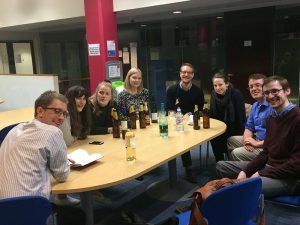
Over the years, the departments of history at UNC-CH and King’s College London (KCL) have built a strong partnership that now includes graduate student programs, conferences, and co-edited books. Most recently, UNC-CH hosted a graduate student conference, which marked the end of the seventh annual UNC-CH/KCL Graduate Student Workshop on Transatlantic Historical Approaches.
The annual graduate student workshop is a longstanding feature of the interdepartmental collaboration, supported in part by the UNC-CH Graduate School. Each year, the workshop includes three graduate student pairs, each comprised of one student from UNC-CH and one from KCL. This year, the pairs first presented their work at a conference in London in May, and they met for a second conference in Chapel Hill in September. After each conference, the graduate students spent a day together, reflecting upon and working through the comments and questions raised during their conference panels.
That the graduate student pairs participate in two conferences is a particularly innovative aspect of the workshop, as it allows the students to develop their projects in tandem. “The hope is that the May paper will help them see how their research projects intersect or differ, and then in September they can present new research based on material gathered during the summer,” explained UNC-CH student coordinator Mark Reeves, who participated in the UNC-CH/KCL Workshop last year.
Although the workshop has a transatlantic focus, Reeves and other organizers try to draw graduate student participants from a variety of fields of history. Often, the creative graduate student pairings that result demonstrate that projects with disparate geographic or temporal focuses can have thematic or methodological commonalities.
One such pairing was Alyssa Bowen of UNC-CH and Christian Melby of KCL. Bowen’s workshop paper examined British opposition to Chilean leader Augusto Pinochet’s junta in the 1970s, while Melby’s paper focused on British invasion scares in the late nineteenth and early twentieth centuries. These papers had important thematic overlaps. “Our papers both examined the interaction between nationalism/national identity and public opinion, particularly the way fear of ‘others’ can provide the rationale for political action,” Bowen said.
Participant Lenny Hodges, a graduate student at KCL, found the different perspectives that he and partner Garrett Wright brought to their work on the French empire to be particularly helpful. “Forming a joint panel with Garrett was especially rewarding, as our different focuses and approaches to the French early modern empire complemented each other in a meaningful way,” Hodges explained.
These different focuses and approaches often reflect the fact that the graduate students come from distinct academic cultures. “You’re getting feedback not just from a colleague in your field that’s working on a similar topic, but also from someone who’s emerging from a different intellectual context,” faculty liaison and UNC-CH Director of Graduate Studies Chad Bryant said. “So the questions you get are very valuable. The comments you get are very valuable.”
The relationships developed during the annual UNC-CH/KCL Graduate Student Workshop sometimes continue long after the workshop ends, which only furthers the supportive relationship that the departments share. Some former UNC-CH participants have included King’s College professors on their dissertation committees, and others have built strong global networks. “My colleague in last year’s workshop has proven a critical link to my research in Nigeria, which she hails from and works on,” Reeves said. “These connections thus reach far beyond the year’s workshops as friendships and professional connections.”
UNC-CH graduate student Elizabeth Hasseler and KCL partner Anais Waag also participated in the workshop this year. Commentators from UNC-CH at the September conference included faculty members Marcus Bull and Lloyd Kramer, as well as postdoctoral fellow Dr. Kyle Mays.
While many view the UNC-CH/KCL Graduate Student Workshop as the highlight of the collaboration, members of the two departments have worked together on a number of other projects. Faculty at both schools have hosted conferences which bring in scholars from other institutions. Recently, one such conference resulted in a book, Walking Histories: 1800-1914 (2016). Edited by Chad Bryant and KCL professors Paul Readman and Arthur Burns, Walking Histories examines the meaning and practice of walking in a number of times and places.
–Aubrey Lauersdorf
